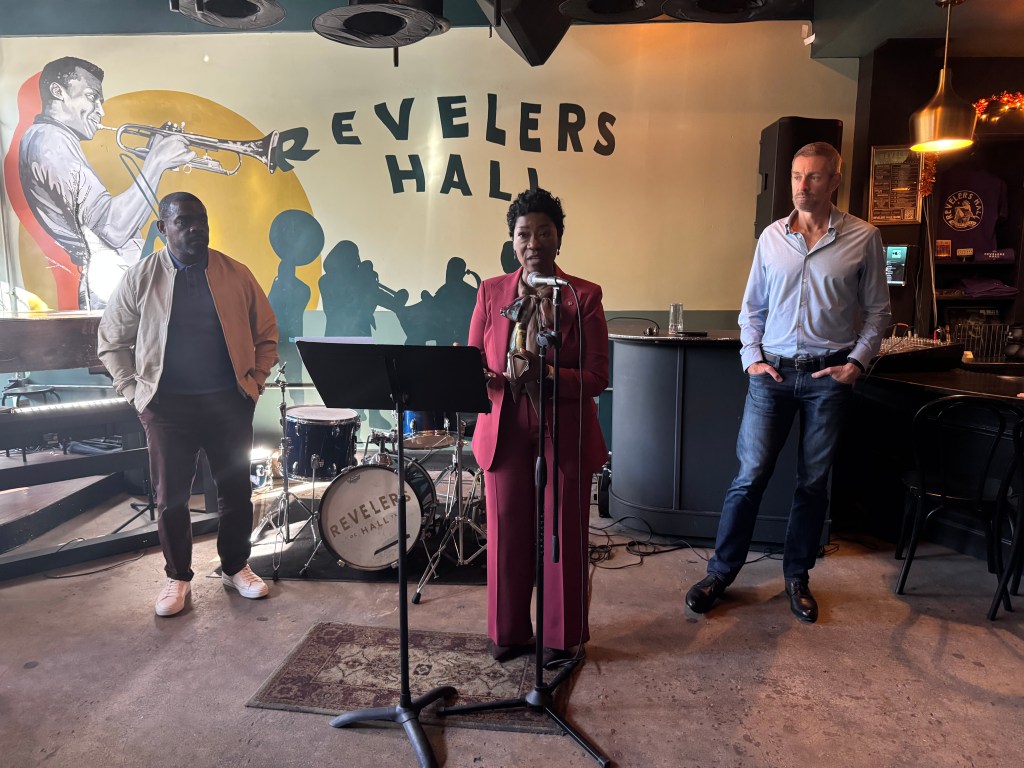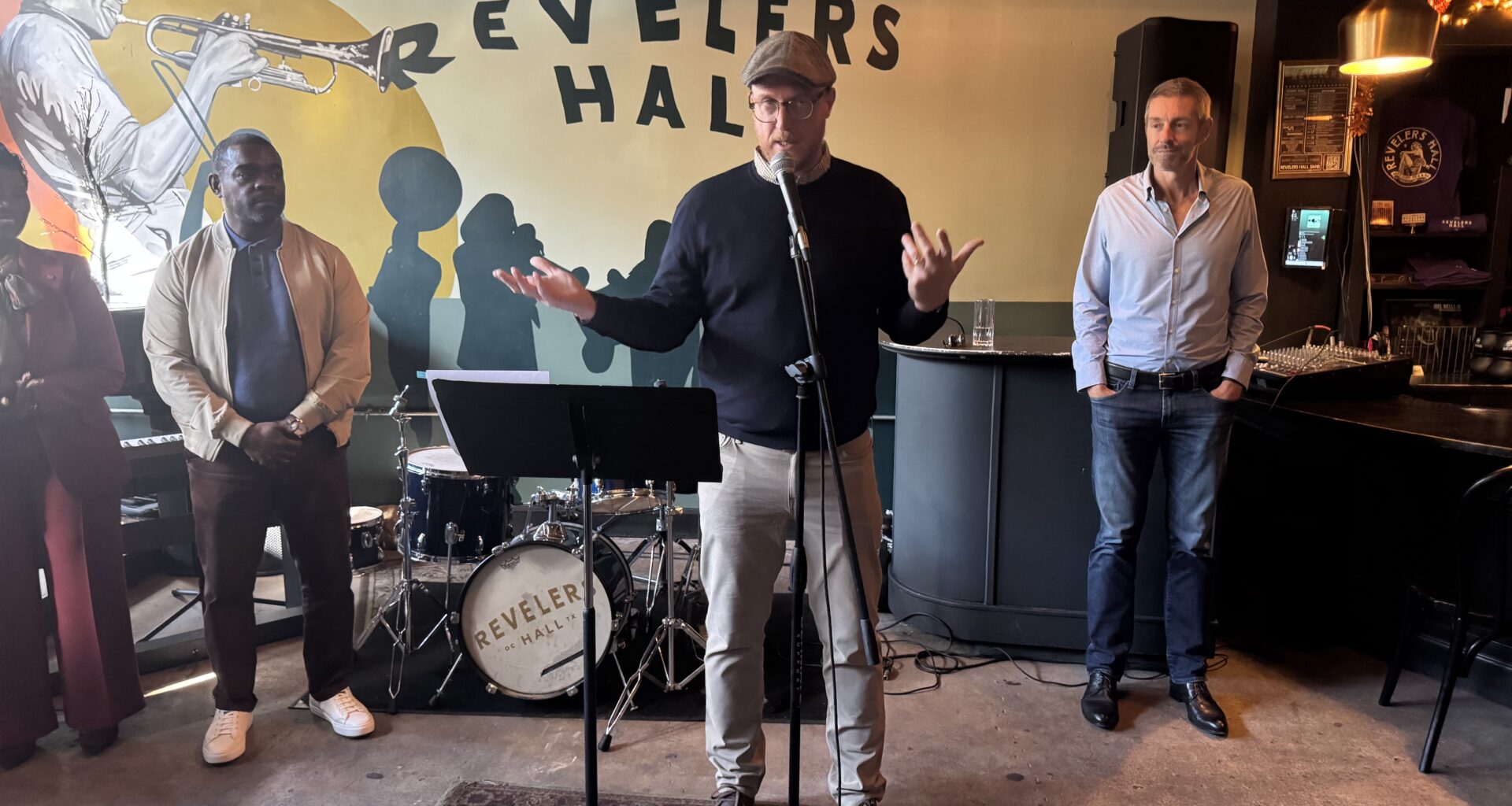
Revelers Hall owner Jason Roberts speaking at this afternoon’s press conference announcing the Hospitality and Nightlife Task Force.
Eric Diep
When Dallas code enforcement officers informed two popular restaurants earlier this month that they could no longer charge the cover fees required to offer live music, the response from commenters on social media was swift and angry: The city was threatening the livelihoods of local musicians and the future of these and similar businesses.
At a news conference on Friday, city leaders made it clear that they had heard and were ready to tackle the problem — with a task force that will review city codes and offer suggestions for solutions. Those are due to arrive next spring, before the FIFA World Cup comes to town.
Facebook posts by the owners of The Free Man in Deep Ellum and Revelers Hall in the Bishop Arts District started the small storm that led to the creation of the task force. The two restaurants had been charging a cover to pay musicians for years and were blindsided when they learned early in October that their restaurant permits didn’t allow that. Code enforcement ordered them to remove their cover charges immediately. If they wanted them back, they’d have to get a different kind of permit, they say, which is less compatible with their main business — serving food and drinks, in this case, to people who like jazz.
The Free Man charged $10 for live music. Revelers Hall added $6 to people’s tab, which is clearly stated on menu pages, signs in the interior and on its website.
At Friday’s conference, Council Member Chad West announced that the city is establishing a Hospitality and Nightlife Task Force. He was joined by Quality of Life Committee Chair Zarin Gracey and task force members Jason Roberts, owner of Revelers Hall, and Abel Mulugheta, representing the Greater Dallas Chapter of the Texas Restaurant Association.
“Our city should be doing everything possible to help businesses like Revelers Hall thrive,” West said. “Not make it harder for them to exist. And this isn’t an issue that is limited to Bishop Arts. It affects places like Free Man in Deep Ellum, the Libertine in Lower Greenville. We anticipate Wild Detectives just down the street and others across Dallas. And once again, to be clear, I’m not blaming code compliance here. They are doing their job. And I know that there are some bad operators in Deep Ellum that really need to be held accountable.”
The city’s rules needed to be updated to reflect the realities of today’s economy and entertainment culture. The task force includes 14 members representing Dallas’ hospitality industry and will be chaired by Terry Lowery, former director of Dallas Water Utilities.
“This task force will work closely with city staff, neighborhood stakeholders and business owners to find a balanced, modern approach that supports good operators while maintaining public safety and the neighborhood quality of life,” West said. “Specifically, I’ve asked the group to, one, review the music fee issue, two, re-examine the city’s noise ordinance, and three, explore the creation of a new entertainment permit that supports innovation and flexibility. The recommendations will go before the Quality of Life Committee in the spring of 2026.”
The task force is due to deliver its recommendations by the end of February. After vetting by staff, they are expected to appear before the City Council in March. By city standards, this is a fast timeline spurred by the arrival of World Cup matches in June. What happens until then?
“Right now, we’re adding a ‘Donation to Revelers Musicians’ fund to our tabs … which is allowed, Roberts said. “We just aren’t allowed to charge an entrance fee or anything tied to that specific evening’s performance. It’s a little wonky, but keeps us compliant while the city updates its codes and permitting.”
Roberts outlined one model of adding a music fee to customers’ tabs.
“I came from a live music background, so I loved the arts, really wanted to put together a jazz venue,” Roberts said. “The trouble we found was these little spots, I mean, we’re 1,300 square feet. It’s hard to make the numbers work in order to bring the talent that we have in the city to play here. These guys, they deserve to make a living wage. And so the model we came up with we found in New Orleans. That restaurant charged a music fee that was added to the end of your tab. That’s maybe the model that we could apply here. And it’s been working well. We paid out every year about $300,000 to the local musicians, which is amazing for a little tiny space of this size.”
 City Manager Kim Tolbert encourages collaboration with the community and various city departments.
City Manager Kim Tolbert encourages collaboration with the community and various city departments.
City Manager Kim Tolbert emphasized the importance of urgency. She says her staff is committed to working alongside the Hospitality and Nightlife Task Force.
“The Night Entertainment Team will be housed under the Office of Cultural Affairs under the directorship of Martine Philippe,” Tolbert said. “Together we will solve issues. We don’t run away from our problems; we run to the problem, and we want to make sure that we’re addressing this dead-on. I truly believe that that’s what good governance looks like. It’s about how we identify challenges, how we work together and bring real solutions that strengthen our city.”
